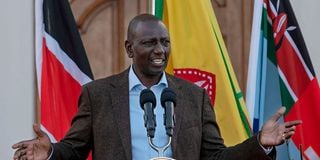Kenya pledges to ratify Malabo protocol in push to fortify Pan-African Parliament

President William Ruto.
Johannesburg,
Kenya will ratify the 2014 Malabo protocol by September, President William Ruto has said, a move that would make tthe country the 16th out of the 28 simple majority required to make the Pan-African Parliament a fully fledged legislative organ of the African Union (AU).
So far, the continental parliament, which is the third organ hierarchically after the AU and the African Union Commission (AUC), only plays the consultative and advisory roles.
The 2014 Malabo protocol is seeking to expand the roles by adding the legislative aspect that will see the legislature fully oversee the AU.
Out of the 22 member states that have signed the protocol, only 15 have ratified it and Kenya could be the next in line, leaving a deficit of 12, some 19 years later.
President Ruto said he was surprised to learn that Kenya was yet to ratify the protocol.
“I want to undertake that before September. We will have concluded that exercise. Take it from me because we are believers in this continent and Kenya is a champion of consolidating our issues around the African Union,” he said.
The President urged legislators in the Continental House to not only formulate laws and policies but also rigorously oversee their implementation to ensure the AU performs at the level of its aspirations.
“Otherwise African solutions, Agenda 2063, the African Continental Free Trade Area-AfCFTA and the young, green, clean continent of the future will remain a mere pipe dream.”
He reminded the representatives that the power they wield comes with accountability and that it is time to rethink the architecture and governance structure of the AU.
“This parliament must provide accountability mechanisms to make sure all the structures of the AU are ultimately answerable to the people in the continent,” Dr Ruto said.
The President further challenged the Pan-African Parliament to “rise to the occasion”, saying it is completely against the principles of accountability to have an impotent Parliament.
“A Parliament that cannot approve the budget of our organisation and hold to account the executives in our administration is not the kind of parliament envisaged by the African people and the forefathers who constituted the union,” said Dr Ruto.
He further called for radical reforms at the continental body saying it is not possible for heads of state and government to hold all the power and expect the union to function.
“We must be courageous and bold enough to delegate some of the powers of our nations to the collective body of the AU. That’s what other progressive unions like the EU have done.”
President Ruto sympathised with AUCchair Moussa Faki Mahamat, whom he said has been held hostage by the union and does not have what is needed to push the continent’s agenda.
“We still hold all the power as heads of state and expect the union to function. It can't. We have to donate some of the power to the collective authority of the union.”
He underlined that the Pan-African Parliament must operate at the same level as the European Union Parliament if the AU is to engage the EU as an equal.
Only 15 countries have signed and ratified the agreement which was adopted at the AU Assembly of Heads of State and Government meeting in June 2014 in Equatorial Guinea in June 2014.
They are Benin, Cameroon, Chad, Equatorial Guinea, Gambia, Ghana, Madagascar, Mali, Morocco, Niger, Sahrawi Arab Democratic Republic, Sierra Leone, Somalia, Togo and the Central African Republic, which ratified the protocol last week
On Monday, Fortune Charumbira, the chief of the Pan-African Parliament, expressed his disappointment in AU chair Azzali Assoumani of the Comoros because of the slow rate at which member states are ratifying the protocol.
It was expected to have taken effect by 2009 as promised during the March 18, 2004 inauguration of the Parliament.
“If you look at the rate at which member states are ratifying the Malabo protocol, it may take more than 50 years or we may never get the 28 ratifications,” said Mr Charumbira
The Pan-African Parliament, that is based in Midrand, South Africa, which exercises oversight and has advisory and consultative powers, sits for five years before new members replace country representatives.
Its aim is to create a space where people from all states in Africa can meet, deliberate on and pass policies that affect the continent as a whole.
Kenya’s latest five representatives are Senator Danson Mungatana, who is the leader of the delegation, Senate Deputy Speaker Margaret Kamar, Nairobi Woman Representative Esther Passaris, Nyeri’s Rahab Mukami and Kabuchai MP Majimbo Kalasinga.





